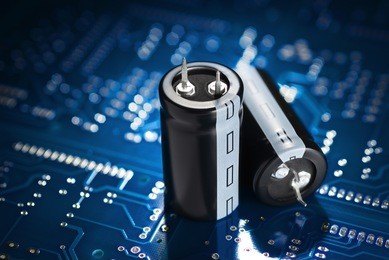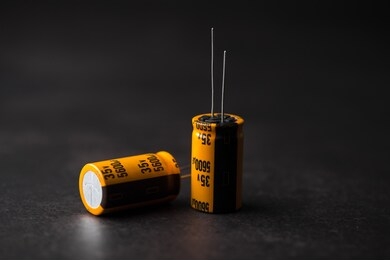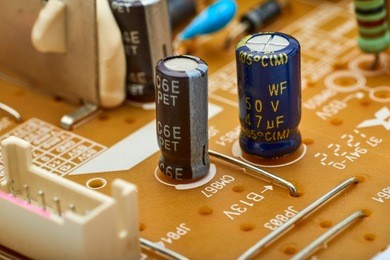A capacitor is an electronic component that stores electrical energy in integrated circuits. It's made up of two conductive plates separated by an insulating material called a dielectric. The plates can be made of metal, and the dielectric can be ceramic, plastic, or other materials. When voltage is applied across the plates, an electric field is created, and positive and negative charges accumulate on either side of the capacitor. This process stores electrical energy. Capacitors are widely used in electronic circuits for various purposes, including energy storage, smoothing voltage fluctuations, and filtering signals. Capacitors play a crucial role in regulating and stabilizing electrical systems.
Capacitors are essential electronic components with diverse functions, including energy storage, smoothing and filtering, timing elements, coupling and decoupling, signal filtering, tuning in radio circuits, energy backup, and so on.

As for different applications, capacitors can be classified into different types. Here are the types of capacitors and their characteristics:
- Ceramic Capacitors: Compact and common, ideal for high-frequency applications.
- Electrolytic Capacitors: High capacitance, suitable for filtering and power supply circuits.
- Tantalum Capacitors: Compact electrolytic type with higher stability.
- Film Capacitors: Utilized in audio circuits, offering low distortion and high reliability.
- Variable Capacitors: Adjustable capacitance, often used in tuning applications.
- Supercapacitors: High-capacity devices for quick energy storage and release.
- Mica Capacitors: Known for stability and precision in radio frequency circuits.
- Polymer Capacitors: Combining characteristics of electrolytic and solid-state capacitors, suitable for compact designs. Choosing the right type ensures optimal performance in electronic systems.

Capacitors play a vital role in numerous industries, contributing to the functionality and efficiency of various electronic systems. Here's a glimpse into their diverse applications across industries:
- Electronics Industry:
Consumer Electronics: Capacitors are integral to devices like smartphones, TVs, and audio equipment, ensuring stable power supply and signal processing.
Computing: Capacitors are crucial components in computer motherboards, power supplies, and memory modules.
- Power Electronics:
Power Supplies: Capacitors smooth voltage variations, ensuring a constant and reliable power source in power supply units.
Inverters and Converters: Capacitors help store and release energy in applications like renewable energy systems and electric vehicles.
- Automotive Industry:
Ignition Systems: Capacitors assist in providing the high-voltage pulse needed for spark plugs in internal combustion engines.
Electronic Control Units (ECUs): Capacitors stabilize voltage and filter signals in various automotive electronic systems.
- Aerospace and Defense:
Communication Systems: Capacitors are used in radar systems, satellite communication, and avionics for signal processing and filtering.
Guidance Systems: Capacitors play a role in precision-guided munitions and navigation systems.
- Industrial Sector:
Motor Control: Capacitors facilitate the starting and running of electric motors in industrial machinery.
Automation Systems: Capacitors contribute to the stability and efficiency of control circuits in automated processes.
- Telecommunications:
Base Stations: Capacitors are employed in power supplies and signal processing units for reliable communication networks.
Fiber Optic Systems: Capacitors contribute to signal conditioning and filtering in data transmission.
- Medical Electronics:
Imaging Systems: Capacitors are used in medical imaging devices like MRI and CT scanners for signal processing.
Life Support Equipment: Capacitors ensure the stability of power supplies in critical medical equipment.
- Renewable Energy:
Solar and Wind Power: Capacitors assist in energy storage, smoothing power output fluctuations in renewable energy systems.
- Research and Development:
Laboratory Instruments: Capacitors are part of various measurement and testing instruments, ensuring accurate and stable readings.
The versatility of capacitors extends their influence across industries, making them fundamental components in the modern technological landscape.

If you are interested in any capacitors and electronic components, feel free to contact us!

